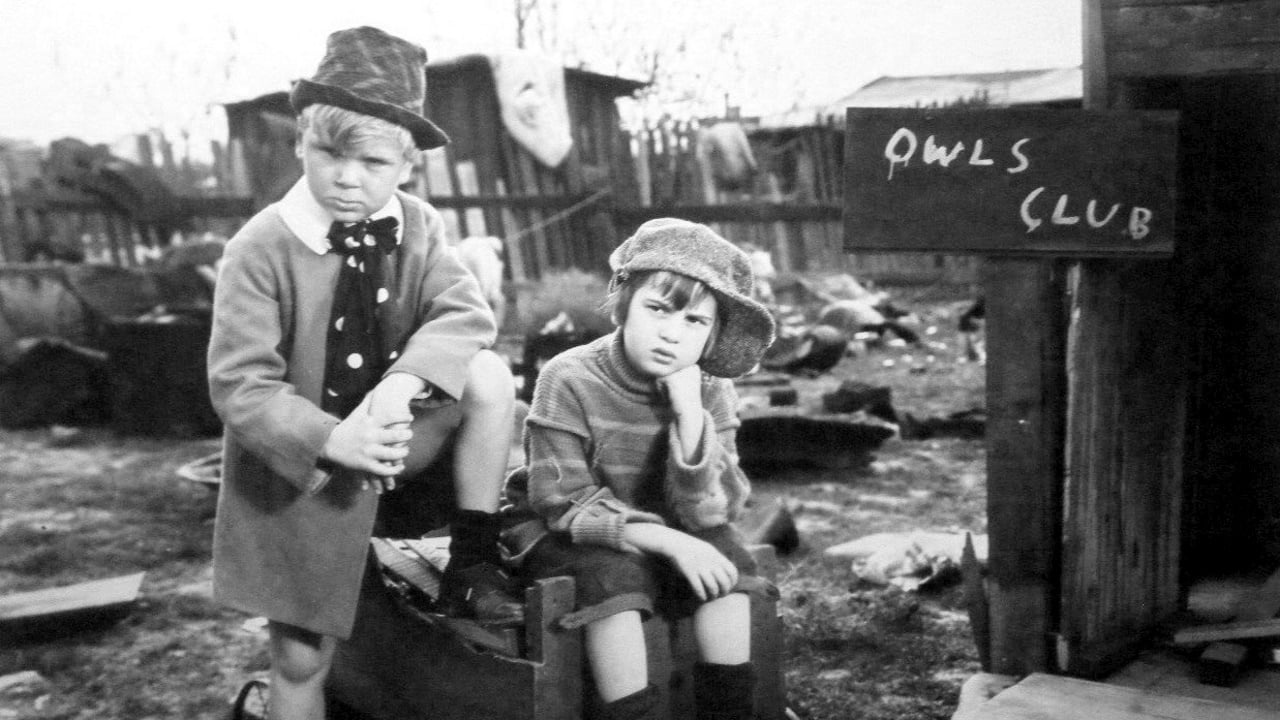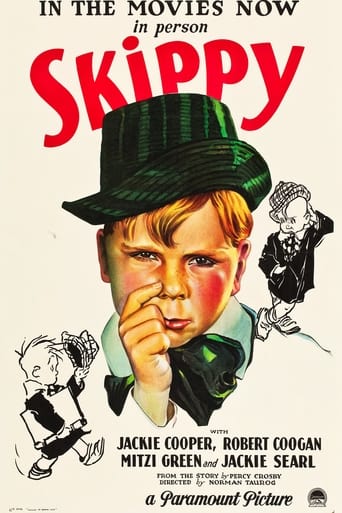



The greatest movie ever!
It's entirely possible that sending the audience out feeling lousy was intentional
View MoreWhile it doesn't offer any answers, it both thrills and makes you think.
View MoreStory: It's very simple but honestly that is fine.
I didn't expect much from "Skippy." How substantial could a Depression-era movie based on a comic strip be? But I found myself really into this film. I watched it with my kids and we all really enjoyed it.It's dated for sure, and the precocious antics of the child actors will likely grate on some. But I liked some of the cultural subtleties in this movie that I found parallels for in our current world. Like the hypocrisy found in Skippy's parents, affluent, casually prejudiced people who think poor, underprivileged folk are deserving of medical care (he's a doctor) but not of basic kindness and empathy (when Skippy wants to go to the "other side of the tracks" his mom asks him if he wants to grow up to be like "those" people). Or the tendency of Skippy's parents to underestimate the complexity of a child's world and who dismiss a child's problems because they're deemed less important than those of adults (not to a child, they're not). Jackie Cooper is the rare child actor, especially from that time period, who's able to be truly winning instead of aggravating. He received an Oscar nomination for Best Actor for his performance, I believe the youngest actor to ever achieve that feat. The film was also nominated for Outstanding Production and Best Writing (Adaptation), while Norman Taurog won that year's Oscar for Best Director. I've read that he got Jackie Cooper to cry at key moments in the film by threatening to shoot his dog. What a guy.Grade: A-
View MoreJackie Cooper (Skippy), Robert Coogan (Sooky Wayne), Mitzi Green (Eloise), Jackie Searl (Sidney), Willard Robertson (Dr Herbert Skinner), Enid Bennett (Mrs Ellen Skinner), David Haines (Harley Nubbins), Helen Jerome Eddy (Mrs Wayne), Jack Clifford (Dogcatcher Nubbins), Guy Oliver (Dad Burkey), Carl R. Botefuhr (Skippy, age 3), Beaudine Anderson (boy), and Dannie MacGrant.Director: NORMAN TAUROG. Scenario: Joseph L. Mankiewicz, Norman McLeod. Dialogue: Joseph L. Mankiewicz, Norman McLeod, Don Marquis. Adaptation: Percy Crosby, Sam Mintz, from the comic strip by Percy Crosby. Photography: Karl Struss. Music: John Leipold. Supervisor: Louis D. Lighton.Copyright 24 April 1931 by Paramount Publix Corp. New York opening simultaneously at the Times Square Paramount and the Brooklyn Paramount, 3 April 1931. U.S. release: 25 April 1931. 7,685 feet. 85 minutes.SYNOPSIS: Boys try to raise $3 to buy a license for their dog.NOTES: Academy Award, Best Directing, Norman Taurog (defeating Clarence Brown's A Free Soul, Lewis Milestone's The Front Page, Wesley Ruggles' Cimarron and Josef von Sternberg's Morocco).Also nominated for Best Picture (Cimarron); Best Actor, Jackie Cooper (Lionel Barrymore in A Free Soul); Writing Adaptation, Mankiewicz and Mintz only (Cimarron).Number 3 in The Film Daily's annual poll of U.S. film critics (Cimarron was first, Street Scene second).COMMENT: Despite the stiff opposition (most critics today would rank Taurog's chances of beating this field at around ten thousand to one), Taurog deserved his Academy Award. His persuasively sympathetic handling of his child stars and the way he has given the film pace by extremely fluid camera-work is faultless. It is unfortunate that the film suffers from the complete absence of a music score (except "natural" music during Skippy's show). That and its quaint costumes (as well as its naive conclusion) make it seem rather dated today, though some scenes still come across with a powerful impact. The story is a simple framework on which the scriptwriters expend a fair amount of ingenuity in developing its plot. But the best thing about it is the dialogue, which has a natural ring to it, yet contrives to be amusing. The children are more convincing and interesting than the adults in the acting department, though Jack Clifford has some glorious moments as the rough-voiced dog-catcher. Karl Struss' superlative photography is another major asset. Production values are — with the exceptions noted above — otherwise excellent.
View MoreParamount Pictures was one step from receivership until Mae West and Bing Crosby signed with them during the Depression. But this film I'm sure kept the wolf from the door for a little while. Skippy which is based on a popular comic strip of the day was the career role for little Jackie Cooper while he was a child star.Cooper was one of the few child stars to have a real career in front of and behind the camera and it was a long one. He also played a wide range of characters. Yet when his name is mentioned today the first thing that comes to mind is the little kid with the knickers and somewhat pouty, but with a good heart and a set of values that he did not get from home completely.Skippy is the child of town doctor Willard Robertson and Helen Bennett and he's a good kid at heart. But Robertson who's a fundamentally decent man doesn't want him playing with the kids on the other side of the railroad tracks. That's shantytown and there were plenty of them in America in 1931. Skippy is a film of its time although I'll bet that people who lived in those shantytowns did not part with the nickel needed to see Skippy, it was needed for important things like food.Robertson as director of the board of health also wants to clean the place up. But with scant regard for the people who live there. So when Skippy makes friends with a slum kid who lives there played by Jackie Coogan's brother Robert and his mother Helen Jerome Eddy and their dog it turns out to be a turning point in everyone's lives.With his decent, but thickheaded father and a mother oblivious to all except what's within the four walls of their home, Skippy grows up with an intuitive sense set of good values. It's what makes Jackie Cooper's character such an appealing one to this day.Skippy brought home a Best Director Oscar for Norman Taurog and a few other nominations. Taurog gets it for some superb direction for a flock of kid players who are the ones carrying the film. It musn't have been easy, but the results are great.Skippy is a film firmly within the Depression times it was made, but it has a universal family appeal to this day.
View MorePercy Crosby's cartoon "Skippy", premiered in "Life" magazine in 1923 and became an instant success. It featured the doings of Skippy Skinner, a little boy living in the city, who was equally at home stealing apples, playing baseball or just trying to understand the world of adults. At one point, Crosby was earning over $2,000 a week - the strip was a phenomenal success and there were Skippy dolls, toys and comic books. Australia also had it's own version, "Fatty Finn", which was turned into a movie that is still fascinating with it's glimpses of Australian suburban life in the 20s. MGM found an ideal "Skippy" in Jackie Cooper (who claimed he only got the part because his uncle was the director). Regardless, he was perfect in the role and even looked like the character.Skippy would rather hang around in Shantytown "a beautiful place", much to the disgust of his father - a pompous doctor who is head of the local council. With his friend, snivelling Sidney - "say I can get away with murder at my place because I'm nervous and strung high", he makes the accquaintance of Sooky (Robert Coogan) a child so poor that even the Shantytown kids shun him. "Gee, it's elegant over here - alleys, goats and dumps". Skippy meets Sooky's mother (sad faced Helen Jerome Eddy) and Penny, his "thoroughbred" dog of mixed breeds. Their arch enemy is Harley Nubbins, whose father is the local dog catcher - of course the inevitable happens and Penny is caught. Skippy and Sooky then have to find a way to raise the $3 needed for a dog license. From selling old bottles, running errands to selling lemonade - nothing works, finally they decide to put on a show. Ordinarily things would end happily but in this movie, this is the time when you reach for the tissues. The movie ends on an extremely positive note and I really liked the way it explored the relationship between father and son, how the father sheds his stuffiness and comes to an understanding about his son and his problems and instantly goes about trying to help him.Robert Coogan was Jackie's little brother but, unfortunately, he didn't inherit the talent - even though he was very cute as Sooky. He made a follow up, "Sooky", in 1931 and a couple of others and then resurfaced in the 40s. Mitzi Green was mightily talented but you would have to seek out her other movies to see her at her best. In this one she was definitely a minor character, Skippy's neighbour Eloise, who recites poems at the drop of a hat ("Ode to a Dead Dog") and has theatrical ambitions. Jackie Searl had more to do as Sidney, Skippy's sidekick and did what he did best - playing an obnoxious little tattle tale. This is a beautiful little trip down memory lane to a time when children were allowed to be children.Highly Recommended.
View More